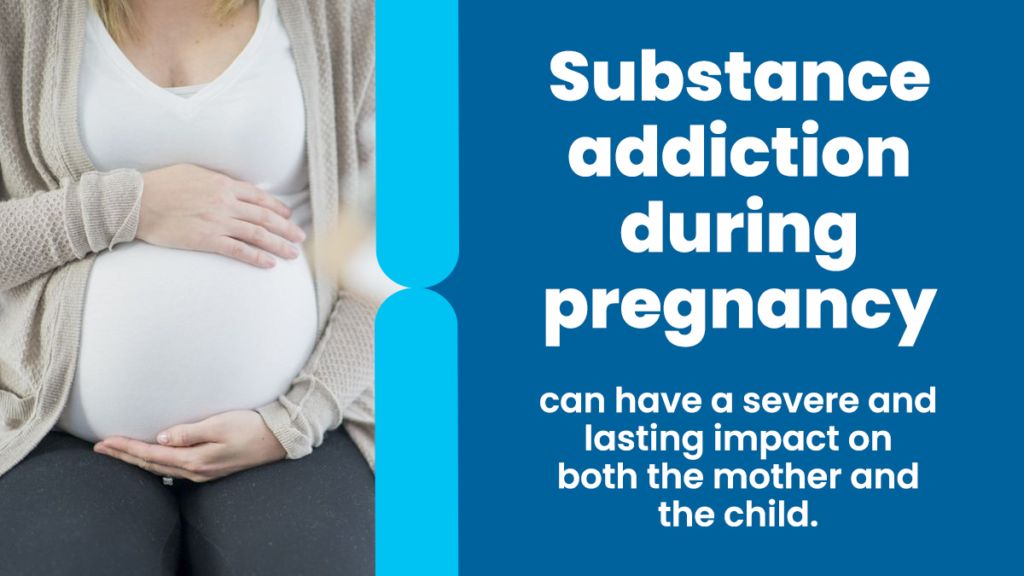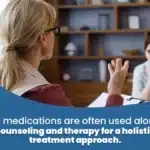Bringing a new life into the world is a momentous occasion, but drug and alcohol use during pregnancy can adversely affect both the mother and baby.
For the mother, substance abuse during pregnancy can lead to high blood pressure, anemia, and an increased likelihood of experiencing complications during childbirth. The baby may experience congenital disabilities, low birth weight, and developmental issues.

This article will explore the effects of various drugs and alcohol during pregnancy. We’ll discuss how these substances can impact a growing baby. Understanding these risks is crucial for making informed choices during pregnancy and safeguarding the health of both mother and newborn.
Key Takeaways
Pregnancy is a crucial time for both the mother’s and the baby’s health, and substance use during this period can result in serious effects. Here is what you need to know:
- In the US, many pregnant women engage in alcohol and substance use, emphasizing the need for substance abuse awareness.
- The most commonly used drugs by pregnant women include alcohol, opioids, tobacco, meth, marijuana, and prescription drugs.
- Substance addiction during pregnancy can have a severe and lasting impact on both the mother and the child.
- Educating pregnant women about the risks of drug and alcohol use is essential for promoting healthier pregnancies.
If you have an alcohol addiction, seek treatment before pregnancy. Contact The Haven Detox-South Florida at (561) 328–8627 for information about our treatment options.
Prevalence of Substance Abuse in Pregnancy
Drug and alcohol abuse during pregnancy remains a concerning issue in the United States, with several studies shedding light on its prevalence and associated risks. These behaviors can seriously affect the mother and the developing baby. Here are some key statistics:
- According to a 2020 research, approximately 10 percent of pregnant women reported using alcohol during pregnancy. Among these women, 40 percent also reported using other substances.
- A study published in 2020 noted that around 74 percent of women who used marijuana before and during pregnancy also smoked cigarettes while pregnant, compounding the risks to the baby’s health.
- The US declares that around 10-11 percent of all babies born in the US are exposed to alcohol or drugs before birth. In many cases, this exposure involves both alcohol and drugs.
These statistics emphasize the urgent need for education, support, and interventions to address alcohol and drug abuse during pregnancy. The health and well-being of both mother and child are at stake, making it crucial to promote awareness about the risks associated with such behaviors.
Pregnancy at Risk: The Effects of Substance Addiction
Pregnancy is a time of joy and anticipation, but it also comes with a great responsibility for the health and well-being of both the mother and the developing fetus. Substance use disorder (SUD) during pregnancy can have severe and lasting consequences for both the mother and the child.
Let’s examine the risks associated with consuming alcohol, tobacco, marijuana, opioids, and meth during pregnancy.
Alcohol During Pregnancy
Drinking alcohol during pregnancy is strongly discouraged as it can result in various complications known as fetal alcohol spectrum disorders (FASDs). These disorders can cause physical, behavioral, and intellectual disabilities in the baby. There is no safe amount of alcohol to consume during pregnancy, so expectant mothers should avoid alcohol altogether.
Tobacco During Pregnancy
Smoking tobacco or exposure to secondhand smoke during pregnancy can harm the baby’s growth and development. Tobacco exposure leads to an increased risk of preterm birth, low birth weight, and even stillbirth. Smoking while pregnant also puts the baby at a greater risk for sudden infant death syndrome (SIDS). Quitting tobacco products before or during pregnancy is one of the best ways to ensure a healthier outcome for both the mother and the baby.
Marijuana During Pregnancy
The use of marijuana, even for medicinal purposes, during pregnancy can negatively affect the baby. The active compounds in marijuana can cross the placenta and affect the baby’s brain development. This may lead to cognitive and behavioral issues later in life. It’s essential to consult a healthcare provider before using any substances, including marijuana, during pregnancy.
Opioids During Pregnancy
Opioids, including prescription painkillers and illegal drugs like heroin, can cause serious problems during pregnancy. Babies exposed to opioid drugs in the womb can develop a condition known as neonatal abstinence syndrome (NAS), where they experience withdrawal symptoms after birth. It’s crucial for pregnant women who are struggling with opioid addiction to seek medical help to manage their addiction and protect their babies.
Meth During Pregnancy
Using methamphetamine (meth) during pregnancy can have severe consequences. It could result in preterm birth, low birth weight, and developmental issues. Babies born to mothers who use meth during pregnancy might face challenges such as feeding difficulties and developmental delays. Seeking support to overcome meth addiction is essential for the mother’s and baby’s health and well-being.
Cocaine During Pregnancy
Cocaine use during pregnancy has been linked to a higher risk of placental abruption, premature birth, intrauterine growth restriction (IUGR), and developmental disabilities. Babies born to a pregnant person who uses cocaine during pregnancy might face challenges in their physical and cognitive development. Seeking support to quit cocaine use is essential for a healthy pregnancy.
Prescription Medications During Pregnancy
Some prescription medications can pose risks to the developing fetus. It’s important for pregnant people to consult their healthcare providers before taking any medicines. Healthcare providers can assess the benefits and risks and recommend safer alternatives if needed.
Education and Awareness: A Path to Safer Pregnancies
When a woman is pregnant, her body becomes a nurturing home for growing life. Everything she does during this time can impact the health and development of her baby. One critical aspect that demands attention is avoiding alcohol and drug use.
Let’s explore why education and awareness about the risks of alcohol and drug usage during pregnancy are vital for both mothers and their unborn children.
Understanding the Impact
Using addictive substances during pregnancy can severely affect the baby’s health. These substances can easily pass through the placenta from the mother’s bloodstream to the baby. This can lead to developmental problems, congenital disabilities, and even lifelong health problems. Educating expectant mothers about this direct link helps them grasp the gravity of their choices.
Healthy Development
A baby’s organs start forming in the earliest weeks of pregnancy. Any interference from drugs or alcohol can disrupt this delicate process. For instance, alcohol consumption can lead to fetal alcohol spectrum disorders (FASDs), causing cognitive and behavioral problems. By raising awareness about the crucial stages of fetal development, we empower mothers to make informed choices that nurture healthy growth.
Risks and Complications
Drug and alcohol use heightens the risk of miscarriage, stillbirth, and premature birth. Babies born prematurely often face challenges like respiratory problems and developmental delays. These risks are significantly amplified when substances are introduced into the equation. There are also several risks to the mother, such as infection and excessive bleeding. Educating mothers about these potential complications gives them compelling reasons to avoid harmful substances.
Empowering Expectant Mothers
Pregnancy can be overwhelming, especially for first-time mothers. Many women might not be fully aware of the risks related to alcohol and drug use. Educating them gives them the power to control their and their baby’s health. Empowered mothers are more likely to make positive choices for themselves and their children.
Breaking Myths and Misconceptions
There are numerous myths about what is safe and what isn’t during pregnancy. Some might believe that occasional or light drinking is harmless. Education helps dispel these myths and provides accurate information. When expectant mothers are armed with facts, they can confidently reject risky behaviors.
Involvement of Healthcare Providers
Healthcare providers play an essential role in educating pregnant women. Regular prenatal check-ups offer opportunities to discuss lifestyle choices and their impact. When medical professionals stress the importance of avoiding drugs and alcohol, it reinforces the message and underscores the seriousness of the matter.
Support Systems
Pregnancy can be emotionally challenging. Support from family, friends, and partners is invaluable. By educating pregnant women and those around them, we create a network that encourages healthy choices. When everyone understands the risks, they can provide the necessary support to ensure a safe and healthy pregnancy.
Frequently Asked Questions (FAQ)
What are the effects of prenatal exposure to drugs and alcohol?
Prenatal exposure to drugs and alcohol can harm babies. It can lead to congenital disabilities, learning problems, and behavior issues. This happens because these substances affect the baby’s developing brain and body. Therefore, pregnant women need to avoid drugs and alcohol to keep their babies healthy.
What happens when drugs cross the placenta during pregnancy?
When drugs enter the placenta during pregnancy, they reach the baby. This can harm the baby’s growth and health. The developing baby is sensitive to these substances. Drugs can affect the baby’s brain, organs, and body systems. This might lead to congenital disabilities, learning difficulties, and other problems. So, pregnant women need to avoid drugs to protect their babies’ well-being.
What are the potentially harmful effects of alcohol consumption during pregnancy?
Drinking alcoholic beverages while pregnant can harm the baby. It may lead to developmental issues and lifelong learning disabilities. Alcohol can damage the baby’s brain and organs, causing problems like fetal alcohol syndrome (FAS). FAS can affect how the child looks, thinks, and behaves. Pregnant women should avoid alcohol to ensure the best health for their babies.
How can a pregnant mother seek help for addiction?
If a pregnant mother is struggling with addiction, there is help available. She can talk to her doctor or a healthcare provider. They can offer guidance and connect her to support services. Local support groups, counseling, and treatment programs can assist in overcoming addiction. Seeking help is crucial for the mother’s well-being and the health of the unborn baby.
Are the effects of drug and alcohol use during pregnancy reversible?
The possible effects of drug and alcohol use during pregnancy might not be completely reversible. Some damage done to the baby’s development could be long-lasting. However, stopping substance use and providing a healthy environment can improve outcomes. Early intervention, medical care, and supportive parenting can help mitigate the impact and give the child the best chance for a healthier life.
The Haven Detox-South Florida: Where Hope Blossoms
If you have a substance use disorder and are at risk of pregnancy, don’t wait to seek treatment. The Haven Detox-South Florida specializes in addiction treatment, offering the help you need. Our expert team is committed to guiding you through this phase with compassion and understanding.
Our specialized medical detox program gently removes harmful toxins from your body, ensuring a safer start to your recovery journey. For those needing more intensive care, our 24/7 residential treatment program provides the support and guidance you need to conquer addiction.
Contact us at (561) 328–8627 today, and let us be your partner in this journey. You’re stronger than you know, and with our expert care, you can overcome anything.






